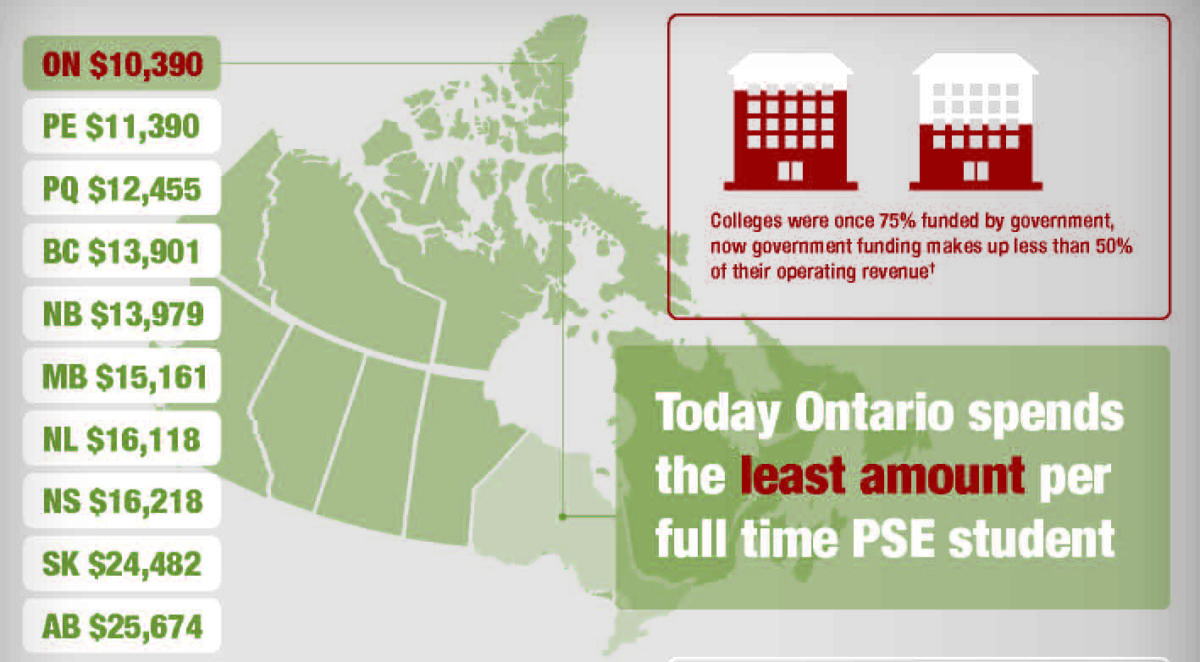Union leader says faculty willing to strike for recommendations in new report on education in Ontario colleges

A report published by the union that represents faculty at Ontario’s 24 colleges sets out their case in the lead-up to this summer’s collective bargaining and a possible strike.
The “Report on Education in Ontario Colleges” was researched and written by Kevin MacKay, a professor at Mohawk College who is also the local president of the OPSEU faculty local there.
The report identifies a combination of under-funding of the college system by successive provincial and federal governments, in particular the deep cuts in spending in the 1990s, as the fundamental reason for what the report calls a “crisis” in Ontario colleges.
The report states that colleges were once 75 per cent funded by government grants and that has fallen to 50 per cent. Meanwhile, the percentage of revenue collected by colleges in tuition has increased from 9 per cent in 1987-88 to a full third of their revenues today.
At a panel discussion in Toronto launching the report on April 24, Graeme Stewart from the Ontario Confederation of University Faculty Associations compared the college’s increased reliance on unregulated tuition of international students to heroin addiction.
MacKay said, “international students are great, but without the supports they need they’re being ripped off.”
According to the March 2013 financial statement of George Brown College, international students accounted for 29 per cent of the college’s tuition revenue but are only 11 per cent of students.
According to Colleges Ontario, 220,000 full-time and 300,000 part-time students are in college in Ontario, including a record five per cent increase in first-year full-time program enrolment this year.
The report says this fiscal crunch has translated into colleges looking for ways to cut costs.
Currently there is a three-to-one ratio of part-time to full-time faculty in Ontario colleges but the report notes that may actually be more part-time faculty due to gaps in reporting. The report notes that the number of full-time faculty has dropped by almost 16 per cent in colleges.
“Non-full-time don’t receive adequate time for course preparation or evaluation, nor do they receive adequate time for student email communication, faculty meetings, or student meetings,” states the report. “Part-time faculty may also be working other jobs – either in industry or teaching at different educational institutions. All of these factors can impede their ability to be available for students and to offer the same quality of education as full-time faculty.”

According to the report “faculty perceptions that college management have become increasingly punitive and autocratic is also supported by the number of bullying and harassment grievances that are being filed by faculty across the colleges.”
The report says that in a meeting between one local union president and a dean said, “my job is to try and get around the collective agreement, and your job is to try and catch me.”
Another area focused on in the report in the proliferation of online learning as a cost-cutting strategy.
The report says, “faculty report that many students are unable to learn effectively online and that they feel they are being ‘ripped off’ by required courses either being offered only online or in ‘blended’ format, in which a certain percentage of a course’s face-to-face instruction time is replaced with online time.”
One unidentified program co-ordinator speaking about Mohawk College’s blending mandate quoted in the report said, “the students are getting jobbed.”
In two public opinion polls commissioned by the union and conducted by Vector Marketing, 62 per cent said they trusted professors to ensure Ontario college students get a high-quality education. Only 23 per cent say they trusted college administrators and just 15 per cent said they trusted the provincial government.
The survey also said that 83 per cent of Ontarians, and 91 per cent of 18-24 year olds, think college professors should have the right to criticize management. A similar number supported academic freedom for college professors.
The report makes three recommendations: That there be an all-party select committee on Ontario post-secondary education; That academic freedom and increased full-time staffing be included in the upcoming collective agreement between the union and the colleges; And that the province appoint a task force on college co-governance.
The recommendation for an all-party select committee on Ontario post-secondary education marks a strategic departure from relying on collective bargaining for OPSEU’s faculty union.
According to JP Hornick, OPSEU College Faculty Division Chair and professor at George Brown College, the union sees the Select Committee on Developmental Services as a model that the provincial government could use to address the structure and funding of colleges in Ontario.
The report calls for the select committee to implement a Post-Secondary Education Act modeled after the Canada Health Transfer to bring federal funding for post secondary back to 1992 levels.
At the provincial level they call to bring up per-student government funding to the national average, roll-back college tuition to 1992 levels, cap college administrator salaries, and reintroduce a needs-based tuition grant program.
The report also calls on the government to end new public-private campuses and ensure that new college campuses are fully publicly funded and staffed with faculty union members.
When asked if faculty members would be willing to strike, Hornick answered, “Yes. Our members will stand behind this report.”


